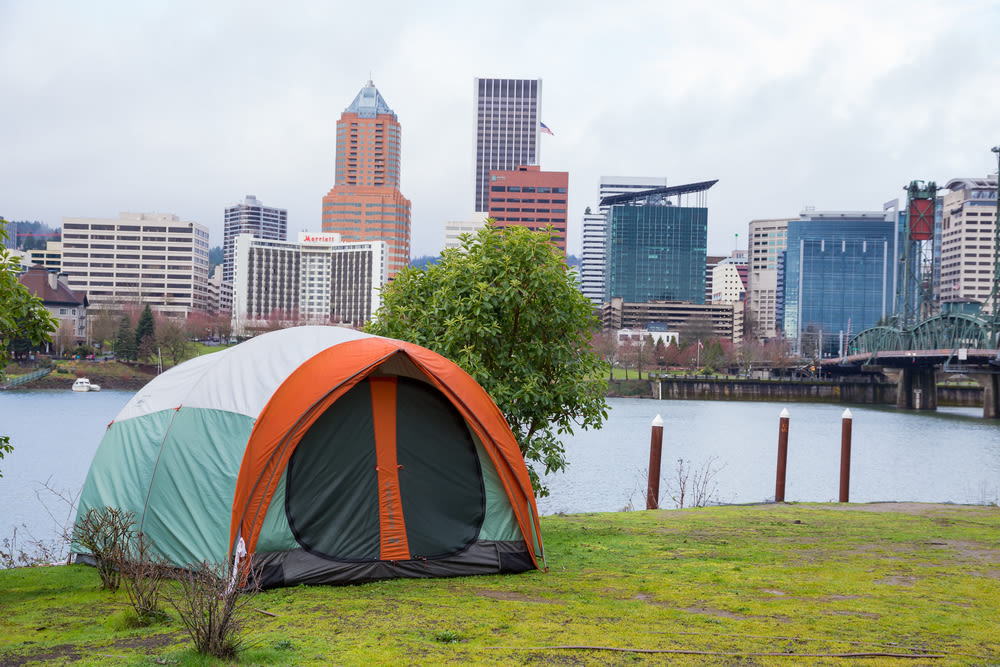At Long Last, Portland Announces 3 Locations For 'Safe Rest Villages'

A rise in camping citywide spurred Portland to announce three new "Safe Rest" sites on Thursday.
Image: Joshua Rainey Photography
An underused park and ride in outer SE Portland, a section of the Springwater Corridor trail in Southeast Portland that is walking distance from one of the city’s most expensive neighborhoods, and a stretch of empty space along the waterfront on the edges of downtown Portland will be transformed into three new managed shelter sites for the houseless community, Portland city leaders announced Thursday after months of laborious planning.
Once they are up and running, only about 180 people, all of them referred by park rangers, social services providers, and other case workers, will be able to move into the three sites, which will feature individual “sleeping pods,” plus on-site toilets, showers, laundry rooms, and kitchenettes, in addition to access to on-site social service caseworkers.
City Commissioner Dan Ryan, who has spearheaded the effort, did not give an exact date for when the three sites will be up and running, nor did he specify when three more promised sites will be announced. The goal is to have them open by January 1, 2022, though the city still needs to do neighborhood outreach, hire service providers, and put up the infrastructure, but Ryan added a caveat: “If we don’t meet that (deadline), we’ll just keep getting up and pursuing it.”
About $20 million has been earmarked for this effort, most of it federal COVID relief dollars. There were 2,037 houseless people living on the streets in Multnomah County as of early 2019, the last time a count was done. No one is certain how many may have joined those ranks since then, but a new count is planned for this January and will cover Multnomah, Clackamas, and Washington Counties, and will also try to tally all those living in emergency shelters and in transitional housing.
The three shelters will be operational for at least three years; their status beyond that is unclear.
“There is a humanitarian crisis on our streets,” Ryan said Thursday. “We can’t wait for affordable housing to be ready for every houseless person.”
Sites were chosen in part for their proximity to public transportation and services, Ryan and others say. The Menlo Park site, which is located right next to a MAX line, will cover about 50,000 square feet. The Springwater Corridor trail site, on Bureau of Environmental Services land, at 8330 SE 45th Avenue, will cover 15,000 square feet. The Naito Parkway property covers 30,000 square feet.
The three new “safe rest villages” are one answer to the tent cities that have popped up in neighborhoods around Portland, particularly since the onset of the pandemic, from Delta Park to the inner Eastside to up and down Powell Boulevard.
Opening sanctioned camping sites with supportive services has not been without controversy, though, including over whether dollars would be better spent on providing long-term housing opportunities; houseless advocates have also questioned the ethics of such managed sites.
“If the city is going to make a huge investment into organized camping, does this become a justification or ability to then criminalize homelessness?” asked Marisa Zapata, an associate professor of land use planning at Portland State University, who directs the school’s Homelessness Research and Action Collaborative. “People who are experiencing homelessness, the most important issue is to find housing, and to be able to stay in housing and to feel safe and respected, and have their humanity affirmed.”
A federal court ruling, Boise v. Martin, makes it illegal in nine Western states for cities to enforce anti-camping rules unless they have enough shelter beds for all campers. Now, Zapata and others say they are concerned that opening the sanctioned camping spots is just a ruse to make it easier for the city to sweep campers out of areas like Laurelhurst Park, where neighbors have complained about finding needles and human excrement in the street surrounding encampments.
Others say it’s long past time for the city to act to curb the growing numbers of tents citywide. People for Portland, a non-profit advocacy group formed to pressure elected officials to move more quickly on houselessness and police reform, says its internal polling shows that 85 percent of Portlanders support setting up such sanctioned camping areas, with on-site mental health and job counseling services.
“Eighty-five percent believe that people should have a safe, sanitary place to sleep,” says Kevin Looper, a political consultant who is a co-founder of People for Portland. “They're not okay just sweeping people and moving them around. That is important to them. But it is also the case that they'd like to feel safe walking around downtown, and they'd like to feel not embarrassed to be a Portlander. And they'd like to think that they're actually part of doing something to help the homeless situation.”
On Thursday, Ryan said the city was still in negotiations for a location for a “Safe Park Village” for people who are living in their cars and RVs. The Portland Expo Center had been considered as a possible location, but is “not today” in the cards, Ryan says—another potential site would have required too much money to get up and running, given plumbing and electrical needs.




